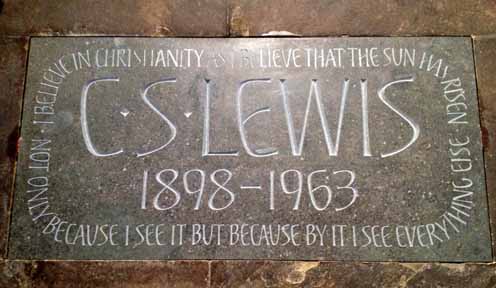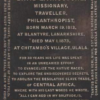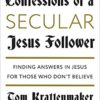I’ve been reflecting on my recent tour of Westminster Abbey where I saw a statue of William Wilberforce and a stone memorializing David Livingstone. In this final blog in the series, I want to consider the stone for C. S. Lewis, placed in 2013, fifty years after his death.
Along with his name and dates of his birth and death, are these words from Lewis’s essay “Is Theology Poetry?”: “I believe in Christianity as I believe that the sun has risen; not only because I see it but because by it I see everything else.”
Chew on that thought for a moment. Do we see everything through the lens of the resurrection? Lewis was trained to think exhaustively about everything long before he came to faith. His boyhood tutor, William T. Kirkpatrick, trained him to support every assertion with reasoning and defend every belief against rigorous attacks. That forged Lewis into a committed atheist who had to wrestle extensively with the gospel before converting. Close friend Austin Farrar described Lewis as “the most thoroughly converted man I ever met.”
This is why we can read Lewis about so-called “religious” topics like faith, temptation, forgiveness, conversion, doubt, sin, prayer, and many other topics and gain valuable insight about living the Christian life. But we can also find in Lewis a love for words, poetry, beauty, story, along with wisdom about money, humor, family, and dozens of other aspects of life so we can appreciate all things as gifts from our Creator.
Lewis even gave thought to mundane things, frequently passed over by others as “idle conversation.” Toward the very end of his life, often feeling tired and weak, he was asked by his assistant Walter Hooper if he ever took a nap. “Oh, no!” he replied. “But, mind you, sometimes a nap takes me.”
I wonder what our lives would be like if we saw everything “by” the reality of the Christian worldview. In addition to seeing all things as gifts from a Creator, we would also remember that all things are sustained by that same providential hand. We would look for design in the midst of chaos, purpose in the midst of confusion, love in the midst of disappointment, care in the midst of discouragement, and joy in the midst of the ordinary.
As I mull over that quote and its implications, I can’t help but wonder what tourists strolling through Westminster Abbey might think when they read those words on Lewis’s stone. Will some of them call into question their assumptions that religion only pertains to certain days of the week or specific hours of the day? Will they entertain the notion that their compartmentalized view of life doesn’t fit? Might they reconsider a faith they discarded long ago? Could they admit that, just maybe, they have been wrong about the way they’ve “seen” life?
Wouldn’t it be a fun story to hear if someone began with, “I took this tour once of Westminster Abbey and I saw this stone there for the guy who wrote The Chronicles of Narnia. I read those books when I was a kid but I never read anything else by him. So, I went to the church’s bookstore and bought something called Mere Christianity. It was great. Have you ever read it?”



